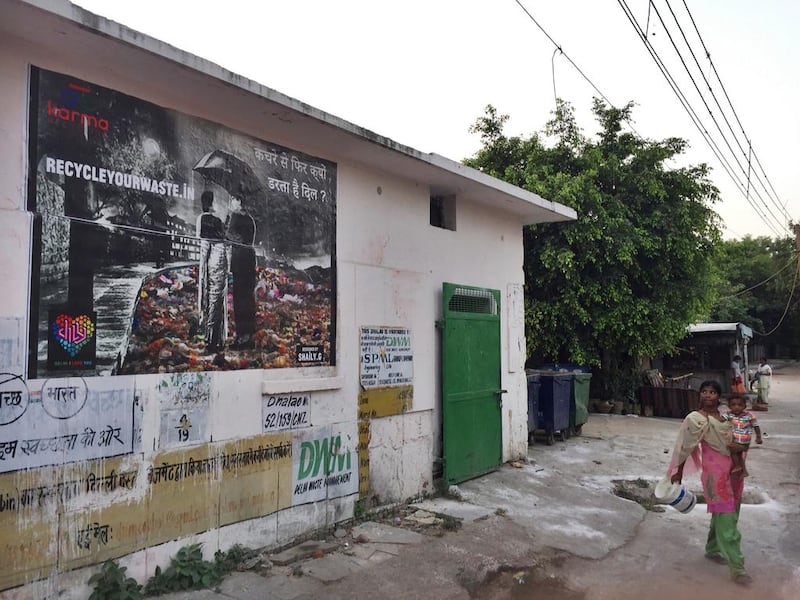New “film” posters in South Delhi are causing passers-by to do a double take – they feature top actors including Shah Rukh Khan, posing on mounds of rubbish.
Akshat Ghiya, the co-founder of Karma Recycling, is behind The Dirty Pictures, a new campaign that seeks to spread awareness about properly disposing of and recycling rubbish, through one of India’s biggest obsessions – Bollywood.
A stinking issue
According to the Economic Survey of Delhi 2012-13, New Delhi generates 8,500 tonnes of solid waste and 10 tonnes of bio-medical waste daily, and 583 tonnes of plastic waste every year, but awareness about reusing, recycling and rubbish disposal is limited to the literate.
The Dirty Pictures might change that. This month, more than 55 rubbish dumps in the southern part of the Indian capital were plastered with the colourful posters.
“With these posters, we are suggesting a reality where, if we don’t start to recycle and reuse our waste through proper channels, the beautiful Bollywood settings so close to our heart will soon be filled with garbage,” says Ghiya, who has collaborated on the project with Karma Recycling, along with Delhi, I Love You, a cultural group in the city, and the architect Shaily Gupta.
They used three cult films – Dilwale Dulhaniya Le Jaayenge and Kuch Kuch Hota Hai, with Shah Rukh Khan and Kajol in the lead roles, and Shree 420, which stars the late Bollywood icons Nargis and Raj Kapoor.
In each poster, the actors are superimposed on a heap of rubbish, while text on the posters features tweaked versions of famous lines from the films.
The DDLJ poster reads: "Bade bade deshon main jagah jagah kooda pada rahta hai (Big countries have piles of rubbish lying everywhere).
“Since Shah Rukh Khan is from Delhi, his posters should have a greater effect in the city,” says Alexis de Ducla, 35, a DILY member.
Responsible recycling
While there are options in the city’s yellow pages and on the internet, the awareness of reusing and recycling is mostly limited to the educated.
“The local kabadiwalas [recycling shops in neighbourhoods] are a big boon, and work to reduce and recycle our plastic, metal and paper waste, but they don’t know the right way to handle electronic and bio-medical waste,” says Ghiya. “Improper disposal can cause serious damage to the environment.”
To counter the problem of the growing number of unserviceable electronic devices in people’s homes, Ghiya runs Karma Recycling, a buy-back operator of mobile devices. A lot of people he serves want to know how to dispose of broken household appliances such refrigerators and washing machines.
“To create a one-stop solution for recyclables, we created the website, recycleyourwaste.in, which provides phone numbers and email addresses for recycling services in Delhi, which pick up reusable/recyclable waste from homes.”
But he realised the website by itself was inadequate – the message needed a bigger canvas, and what better than the bare walls around the city’s dumpsters?
“Personally, I am a lover of the arts and wanted to create a public art project on recycling,” says Ghiya, adding that he contacted the local municipal corporation, earmarked 57 walls and was allowed to put up the posters for free.
Spreading the word
The idea took root earlier this year when Gupta, disgusted by the mountain of rubbish at a park that she likes to go to when taking her daily morning walk, took pictures of the offensive sight, added them to a couple of film posters and shared them on social media. Impressed by the simple but striking images, Ghiya decided they were the perfect way to tackle Delhi’s growing problem.
“People want to reduce and reuse their waste, they just don’t know how,” Ghiya says. “We hope they will log on to the website, which is mentioned on the posters.”
So far, the response has been encouraging.
“This is a great message – if we don’t keep our country clean, who will? Segregating waste and recycling are important, but it is best to create less waste,” he was told by one Delhiite.
Other reactions have made him laugh: “Shah Rukh Khan and Kajol in a new movie – but why are they standing on trash?”
“My message to people is, if you loved your city as much as you love Bollywood, you could live in a much cleaner environment,” says Ghiya, who hopes to take this campaign to other cities in India and around the world.
artslife@thenational.ae





